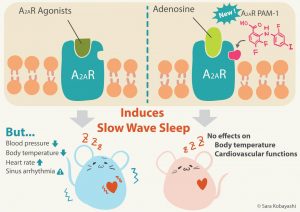New research from the International Institute for Integrative Sleep Medicine at the University of Tsukuba has uncovered a pathway that may lead to new therapeutics to relieve insomnia. A new study done in mice suggests that small molecules that allosterically modulate adenosine A2A receptors (A2ARs) could potentially act to help people with insomnia to fall asleep.
There is a myriad of reasons that people do not get the amount of sleep that they should: stress, anxiety, psychiatric and medical conditions, unhealthy sleep-related habits, substances, and/or certain biological factors. Insomnia, or having difficulty falling asleep or staying asleep, even when a person has the chance to do so, affects roughly 10% to 15% of the general population and 30% to 60% in the older population.
“We believe that allosteric modulators of A2A receptors may help people with sleep problems to fall asleep” says Mustafa Korkutata, the first author of the paper and a doctoral student at the Univeristy of Tsukuba.
Adenosine has long been known to induce sleep via adenosine receptors. Although adenosine A2A receptor agonists strongly induce sleep, they can have strong adverse effects, namely cardiovascular effects, that preclude their use as a viable treatment option for sleep disorders. Enhancing endogenous A2AR signaling, however, could serve as an alternative strategy for treating insomnia, because adenosine levels in the brain accumulate during wakefulness. A new paper titled “Enhancing endogenous adenosine A2A receptor signaling induces slow-wave sleep without affecting body temperature and cardiovascular function” published in the journal Neuropharmacology finds that enhancing endogenous signaling of adenosine A2A receptors may be an alternative strategy for treating insomnia.
 The researchers identified the first positive allosteric modulator for adenosine A2A receptors, known as A2AR PAM-1. In addition, they demonstrated that enhancing A2A receptor signaling induces sleep that is indistinguishable from the major component of natural sleep, known as slow-wave sleep (SWS), characterized by slow and high-voltage brain waves, without affecting cardiovascular function. The A2AR PAM-1 promoted the SWS in a dose-dependent manner in mice.
The researchers identified the first positive allosteric modulator for adenosine A2A receptors, known as A2AR PAM-1. In addition, they demonstrated that enhancing A2A receptor signaling induces sleep that is indistinguishable from the major component of natural sleep, known as slow-wave sleep (SWS), characterized by slow and high-voltage brain waves, without affecting cardiovascular function. The A2AR PAM-1 promoted the SWS in a dose-dependent manner in mice.
The authors state that “3,4-difluoro-2-((2-fluoro-4-iodophenyl)amino) benzoic acid, denoted A2AR positive allosteric modulator (PAM)-1, enhanced adenosine signaling at the A2AR and induced slow wave sleep (SWS) without affecting body temperature in wild-type male mice after intraperitoneal administration, whereas the SWS-inducing effect of this benzoic acid derivative was abolished in A2AR KO mice.” In addition, they note that “in contrast to the A2AR agonist CGS 21680, the A2AR PAM-1 did not affect blood pressure or heart rate. These findings indicate that enhancing A2AR signaling promotes SWS without cardiovascular effects.”
Tsuyoshi Saitoh, Ph.D., a lead author on the paper and assistant professor at the University of Tsukuba, explains that “many obstacles remain to be overcome in generating a novel drug for the treatment of insomnia in humans, but we believe that our discovery will unlock the development of the next-generation sleeping pill.”
In a 2005 National Sleep Foundation (NSF) poll, more than half of people reported at least one symptom of insomnia (difficulty falling asleep, waking up a lot during the night, waking up too early and not being able to get back to sleep, or waking up feeling un-refreshed) at least a few nights per week within the past year.
The most widely prescribed agents for the treatment of insomnia are benzodiazepines and non-benzodiazepines, which are central nervous system depressants that enhance signaling of the major inhibitory neurotransmitter in the nervous system, γ-aminobutyric acid (GABA.) These medications, however, are plagued by a wide range of adverse effects, including muscle relaxation, rebound insomnia, changes in appetite, next-day sedation, cognitive impairment, amnesic effects, and development of drug tolerance and dependence. With limited treatments, novel ways to alleviate insomnia are an important advance for the millions of people who suffer from insomnia.







